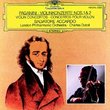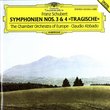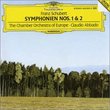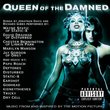| All Artists: Gustav Mahler, Claudio Abbado, Vienna Philharmonic Orchestra, Vienna Boys' Choir, Wiener Sängerknaben, Jessye Norman Title: Mahler: Symphony No. 3 Members Wishing: 0 Total Copies: 0 Label: Dg Imports Release Date: 6/11/1984 Album Type: Import Genre: Classical Styles: Opera & Classical Vocal, Symphonies Number of Discs: 2 SwapaCD Credits: 2 UPC: 028941071521 |
Search - Gustav Mahler, Claudio Abbado, Vienna Philharmonic Orchestra :: Mahler: Symphony No. 3
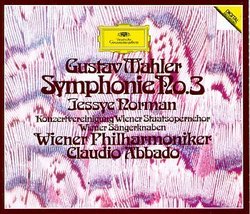 | Gustav Mahler, Claudio Abbado, Vienna Philharmonic Orchestra Mahler: Symphony No. 3 Genre: Classical
Claudio Abbado plumbs the depths of Mahler's most sprawling opus, aided by the Vienna Philharmonic on their most flexible, responsive form. The terrifying first movement trombone snarls and tangy oboe solos elsewhere are w... more » |
Larger Image |
CD DetailsSynopsis
Amazon.com Claudio Abbado plumbs the depths of Mahler's most sprawling opus, aided by the Vienna Philharmonic on their most flexible, responsive form. The terrifying first movement trombone snarls and tangy oboe solos elsewhere are worth the price of these discs, and so are Jessye Norman's haunting contributions in the fourth and fifth movements. --Jed Distler Similar CDsSimilarly Requested CDs
|
CD ReviewsOne of my all-time favorites Von R. Smith | Austin, TX | 11/10/2002 (5 out of 5 stars) "Abbado is a great conductor who has a not-entirely-undeserved reputation as an unsteady Mahlerian. But he has always shown a real knack for Mahler's 3rd, and this earlier digital recording with the VPO, Norman, et al. is a case in point. It is one of my favorite Mahler recordings, in spite of having one of the *ugliest* cover designs in existence.Apart from keeping an audience awake for a 100-plus minute symphony, I think the biggest challenge for anyone interpreting this piece is finding the right balance between its musical and emotional depth and its thrilling showmanship; lean too much one way and the piece becomes too heavy and ponderous, too much the other way and it's a pretty good movie soundtrack but a mediocre symphony. Abbado and the VPO find just the right balance, especially in the first movement, which they manage to present as thrillingly dramatic without being just flashy. Norman is wonderful, especially in the fourth movement; I can't think of a better performance of this movement on any level.My only two complaints (besides the horrid color-scheme of the cover art) are about the 3rd and last movements: the posthorn solos in the former have little presence at all. It sounds as though the trumpet soloist, not content with going offstage, decided to keep going down the street to a nearby Vienna cafe and play his solos from there. The last movement, although lovingly and intensely played, is taken a bit more slowly than I would like, something that Abbado doesn't do to me very often.Still, that isn't a lot to complain about in a piece of this length and size. This is quite simply the best Mahler 3rd in my opinion, and the answer to anyone who says Abbado doesn't get Mahler." One of Mahler's Most Dynamic Works William M Choat | Springfield, IL | 01/31/2000 (5 out of 5 stars) "Mahler's 3rd symphony is one of his most dynamic symphonic pieces, and this recording brings this incredible work to life through a realistic and true reading of the score mixed with a tremendous amount of musicianship. Jessye Norman is stunning, and the choral work is superb. Abbado works so well with this orchestra, and this is my favorite recording of this incredible and vast work.I first heard this recording in Madrid a few years ago, and since that time I have listened many, many times. One never tires through repeated listenings. What an orchestra! What a conductor! What a soloist! A brilliant and stunning recording!" The Definitive Mahler 3rd Symphony recording John Kwok | New York, NY USA | 03/25/2002 (5 out of 5 stars) "Claudio Abbado draws the right dose of drama and lyrical playing from the Vienna Philharmonic Orchestra in this stunning interpretation of Mahler's 3rd Symphony. Undoubtedly this is one of Abbado's finest Mahler recordings, surpassed in quality only by his legendary Mahler 7th with the Chicago Symphony Orchestra, and perhaps by his relatively recent recording of Mahler's 2nd Symphony, also with the Vienna Philharmonic Orchestra. Jessye Norman is splendid during the fourth and fifth movements. The fine sound quality is undoubtedly helped by the Musikverein's warm acoustics. Others may prefer Bernstein's or perhaps Haitink's recordings, but I suspect most will agree that Abbado's account of Mahler's 3rd Symphony remains the finest contemporary recorded version."
|

 Track Listings (15) - Disc #1
Track Listings (15) - Disc #1
